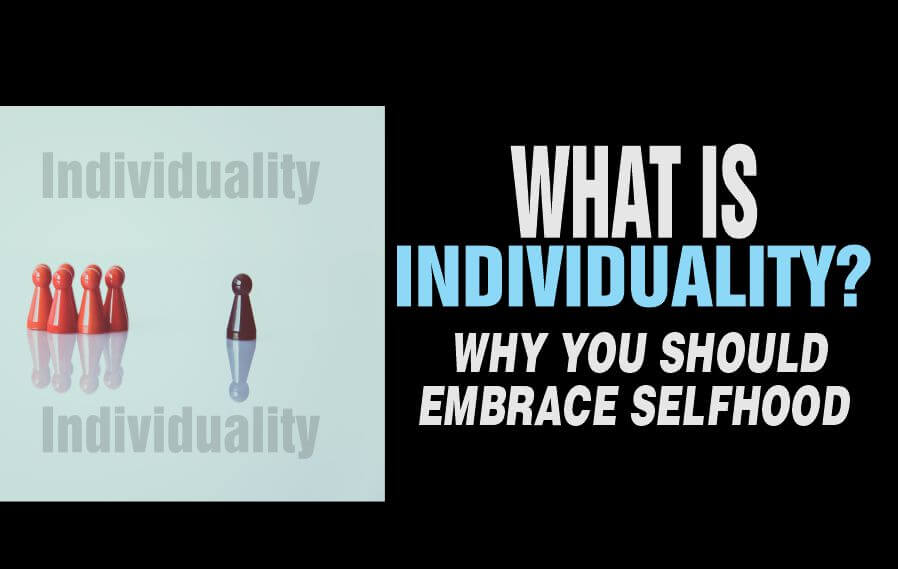Discover the power of embracing your unique self. Explore the essence of individuality and unlock your true potential and selfhood.
Individual uniqueness, a unique and intrinsic quality inherent in each person, serves as the canvas upon which your personal identity is painted.
Every human is a single being with his own principles, choices and distinctive characters that mark him different from others.
This uniqueness that sets you apart from others gives you your identity in society.
Many find it difficult to maintain their originality and distinctiveness, instead, they envy the selfhood of others and this hinders them from self-discovery and reaching their potential.
After extensive research and personal experiences, we have broken this subject down in this article for you to be able to embrace your uniqueness, unlock your true potential, and attain the personal growth you desire.
Understanding Collectivist Culture and Collectivism
Individuality Definition
Individual difference is the distinct characteristics, qualities, and traits that make you unique from others in society.
It covers your thoughts, beliefs, values, preferences, and behaviours, setting them apart from others.
Meaning of Individuality
The Concept of Selfhood
Selfhood is the perception and understanding of yourself as a separate and distinct individual.
It involves a deep sense of self-awareness, including your values, beliefs, interests, and personal experiences.
Selfhood plays a crucial role in shaping individuality, as it forms the foundation of how you perceive yourself and interact with people and society.
Recognizing the Uniqueness of Each Person
Recognizing the uniqueness of each person involves appreciating and respecting the individual differences that exist among people in society.
You shouldn’t expect every other person to, act and reason like you.
It has to do with understanding that no two individuals are exactly alike, and each person brings their own set of talents, perspectives, and contributions to the world.
By acknowledging and celebrating this diversity, you encourage a more inclusive and accepting society that values and embraces selfhood.
Related: What is Individuality Complex?
Factors that Shape Individual Distinctiveness and Selfhood

Individual distinctiveness and selfhood are shaped by a myriad of factors that contribute to the unique identity of each person.
Key influencers of each person’s selfhood include:
Genetics: Inherited traits play a fundamental role, influencing aspects like temperament, intelligence, and physical characteristics.
Environment: Cultural, social, and familial surroundings mould the originality of each person, impacting values, beliefs, and behavioral patterns.
Personal Experiences: Life events, successes, failures, and challenges contribute to the development of your character and perspective.
Education: Formal and informal learning experiences shape knowledge, skills, and worldview, encouraging intellectual uniqueness.
Social Interactions: Relationships with family, friends, and society influence self-perception and contribute to the development of social identity.
Cultural Background: Cultural norms, traditions, and practices shape your worldview, influencing behaviour and values.
Media and Technology: Exposure to media and technology impacts perceptions, interests, and forms a part of modern uniqueness.
Personal Choices: The decisions you make, from career paths to lifestyle choices, actively contribute to your expression of singularity.
Understanding these factors provides insight into the complex interplay that shapes the unique essence of each person.
Related: Balancing Individuality and Collectivism
Celebrating Diversity in Uniqueness
Celebrating diversity in selfhood involves valuing differences and embracing various perspectives, experiences, and ideas.
It means acknowledging unique qualities and backgrounds, and encouraging inclusivity in terms of race, ethnicity, gender, sexual orientation, and abilities.
Appreciating diverse viewpoints promotes personal and societal growth, challenging biases, expanding knowledge, and encouraging creativity.
Enhancing tolerance and acceptance creates a safe environment where everyone feels respected, regardless of differences.
Tolerance recognizes the right to different beliefs, while acceptance goes further by supporting individuals without judgment. By cultivating tolerance and acceptance, society values and uplifts each individual, fostering harmony and understanding.
Related: Advantages and Disadvantages of Living in a Collectivist Culture
Principle of Individuality and Peculiarity
The principle of individuality asserts that each person is a unique and distinct individual with their own set of characteristics, qualities, and traits.
It recognizes that no two individuals are exactly alike, and each person has their own combination of genetic makeup, experiences, and perspectives that shape who they are.
This principle emphasizes the importance of valuing and respecting the uniqueness of each person.
It acknowledges that you as an individual have the right to express yourself authentically, make choices based on your values and beliefs, and pursue your paths in life.
This principle also highlights the significance of recognizing and appreciating the diversity that exists among individuals.
It encourages the celebration of differences in terms of race, ethnicity, gender, sexual orientation, abilities, and more, encouraging an inclusive society that values and embraces the peculiarity of all its members.
Related: Collectivist Society Traits
Opposite of Individuality

The opposite of individual uniqueness is conformity, where individuals suppress their unique qualities, thoughts, and behaviours to fit societal norms and expectations.
Conformity discourages independent thinking, stifles creativity, and promotes a homogenous and uniform society.
It prioritizes collective identity over personal expression, leading to a loss of diversity and the suppression of individual voices.
In a conformist culture, people may fear judgment and rejection, resulting in a lack of authenticity and personal fulfillment.
The opposite of individual identity is a state where uniqueness is suppressed, and individuals conform to a standardized mold, sacrificing their true selves in the process.
Related: Individualistic Culture and Society
Conformity vs Individuality
Conformity and individuality represent contrasting approaches to life and self-expression.
Conformity involves adhering to societal norms, expectations, and groupthink, often sacrificing personal identity and unique perspectives.
It prioritizes fitting in and avoiding conflict but can stifle creativity and personal growth.
In contrast, distinctiveness embraces one’s distinct qualities, thoughts, and values, encouraging independent thinking, self-expression, and authenticity.
It celebrates diversity, promotes innovation, and empowers you to contribute your unique perspectives to society.
While conformity seeks harmony through uniformity, uniqueness thrives on the richness of diverse voices and the freedom to be true to oneself.
Related: What is Meant by Rugged Individualism?
Individuality vs Personality

Individuality and personality are related but distinct concepts.
While selfhood is the unique qualities, traits, and characteristics that make each person distinct from others, personality, on the other hand, refers to the consistent patterns of thoughts, feelings, and behaviors that define an individual’s character.
It is the combination of traits, temperament, and behavioral tendencies that shape how a person interacts with the world.
While distinctiveness focuses on the uniqueness of an individual, personality emphasizes the enduring and consistent aspects of their psychological makeup.
Also Read: What Determines Identity Diffusion?
Benefits and Importance of Individuality
Selfhood brings several benefits that contribute to personal and societal well-being.
Let’s take a look…
1. Encouraging Personal Growth and Development
Embracing individual uniqueness and personal identity allows you to explore your unique strengths, interests, and passions.
It encourages self-discovery and self-awareness, enabling personal growth and development.
By embracing your uniqueness, you can set and pursue meaningful goals, make choices aligned with your values, and continuously evolve into your best selves.
2. Encouraging Creativity and Innovation
Having a self-identity fuels creativity and innovation by encouraging diverse perspectives and ideas.
When you are free to express your unique thoughts and experiences, it sparks creativity and leads to fresh insights.
Also, embracing distinctiveness in a collaborative setting encourages a rich exchange of ideas, pushing boundaries, and driving innovation in various fields.
3. Empowering Individuals to Express themselves Authentically
Personal identity empowers you to be true to yourself and express your authentic self.
It encourages you to embrace your unique qualities, beliefs, and values without fear of judgment or conformity.
This authenticity enhances self-confidence, promotes meaningful connections with others, and a sense of fulfillment and happiness.
4. Creativity and Innovation
Individual originality fuels creativity and innovation. When individuals are free to express their unique ideas and perspectives, it leads to fresh insights, new solutions, and advancements in various fields.
5. Diversity and Inclusion
Being individualistic celebrates diversity and promotes inclusivity. It recognizes that each person brings their own set of talents, experiences, and perspectives, enriching our collective understanding and fostering a more tolerant and accepting society.
6. Authentic Relationships
Individuality allows us to form genuine connections with others. By embracing our true selves, we attract like-minded individuals who appreciate and value us for who we are, leading to more fulfilling and authentic relationships.
7. Confidence
Embracing selfhood empowers you to stand up for your beliefs, make choices aligned with your values, and pursue your passions. It boosts self-confidence and self-esteem, enabling you to navigate life with a sense of purpose and fulfillment.
Related: Personal Identity vs Social Identity
Challenges to Individual Peculiarity

While individual peculiarity is valuable, it faces several challenges in today’s society.
Let’s examine the challenges:
1. Conformity and Societal Pressure
Society often exerts pressure to conform to certain norms, expectations, and standards.
This can discourage individuals from embracing their unique qualities and expressing themselves authentically.
The fear of standing out or being judged can lead to conformity, stifling selfhood and hindering personal growth.
2. Overcoming Self-doubt and Fear of Judgment
Many individuals struggle with self-doubt and fear of judgment, which can undermine their confidence in expressing their selfhood.
The fear of being criticized or rejected by others can prevent you from fully embracing your unique traits and pursuing your passions.
3. Balancing Individuality with Social Expectations
Striking a balance between expressing your uniqueness and meeting social expectations can be challenging.
Society often imposes certain roles, norms, and expectations that individuals may feel compelled to adhere to.
Finding a way to honor personal uniqueness while navigating societal expectations requires self-awareness, assertiveness, and the ability to set boundaries.
Suggested: How you Can Lose Your Individuality & Selfhood
Nurturing Selfhood
Nurturing individual uniqueness involves creating an environment that supports and encourages the development and expression of your unique qualities and traits.
Here is how you can achieve this:
1. Encouraging Independent Thinking and Decision-making
Nurturing individuality involves encouraging independent thinking and decision-making skills.
It means empowering yourself to critically analyze information, form your own opinions, and make choices based on your values and beliefs.
By promoting independent thinking, we enable individuals to develop their own perspectives and contribute their unique ideas to society.
2. Supporting Individual Passions and interests
Nurturing individual differences means recognizing and supporting the passions and interests of individuals.
It involves providing opportunities for individuals to explore and pursue their unique talents and hobbies.
By supporting their passions, they develop a sense of purpose, fulfillment, and personal growth.
3. Building Self-confidence and Self-esteem
Nurturing uniquness requires building self-confidence and self-esteem in people.
It has to do with providing positive reinforcement, constructive feedback, and opportunities for personal development.
Providing a supportive and encouraging environment, you can develop a strong sense of self-worth, enabling you to embrace your uniqueness and express yourself authentically.
Developing an Individuality and Selfhood
Developing individuality is a lifelong process that involves self-discovery, self-reflection, and personal growth.
Here are some steps to help in the development of selfhood:
- Self-reflection: Take time to reflect on your values, beliefs, interests, and goals. Ask yourself questions about what truly matters to you and what brings you joy and fulfillment. Examine your strengths, weaknesses, and distinctive attributes.
- Explore Different Experiences: Engage in a variety of experiences that expose you to new ideas, cultures, and perspectives. Travel, try new hobbies, meet diverse people, and step out of your comfort zone. These experiences can broaden your horizons and help you discover new aspects of yourself.
- Embrace Authenticity: Embrace your true self and be authentic in your thoughts, actions, and relationships. Avoid trying to fit into societal expectations or conforming to others’ opinions. Embrace your individual qualities and authentically express yourself.
- Set Personal Boundaries: Establish boundaries that align with your values and protect your uniqueness. Learn to say no to things that don’t resonate with you and prioritize activities and relationships that support your growth and well-being.
- Continuous Learning and Growth: Engage in lifelong learning and personal development. Read books, attend workshops, take courses, and seek opportunities for self-improvement. This continuous growth helps you refine your identity and expand your knowledge and skills.
- Surround Yourself with Supportive People: Surround yourself with individuals who support and encourage your uniqueness. Seek out relationships with people who appreciate and respect your uniqueness. Their support can boost your confidence and provide a nurturing environment for personal growth.
- Embrace Challenges and Setbacks: Embrace challenges and setbacks as opportunities for growth. Learn from failures, adapt to changes, and use setbacks as stepping stones toward personal development. Embracing resilience and perseverance will strengthen your individual identity.
Encouraging Individuality in Children

Encouraging selfhood in children is crucial for their personal growth, self-confidence, and overall well-being.
Here are some ways to encourage this lifelong skill in children:
- Allowing Children to Make Choices and Express Themselves: Give children age-appropriate opportunities to make choices and express their preferences. This can range from selecting their clothes, deciding on extracurricular activities, or expressing their opinions in family discussions.
- Supporting Their Unique Interests and Talents: Pay attention to children’s interests and talents and provide opportunities for them to explore and develop these areas. Whether it’s art, sports, music, or any other passion, support their pursuits and provide resources or lessons to nurture their skills.
- Teaching Them to Embrace Diversity and Respect Others’ Selfhood: Teach children about the value of diversity and the importance of respecting others’ uniqueness. Motivate them to gain knowledge about diverse cultures, traditions, and perspectives. Encourage empathy and teach them to appreciate and celebrate differences.
- Providing a Safe and Supportive Environment: Create a safe and supportive environment where children feel comfortable expressing themselves without fear of judgment or criticism.
- Avoiding Comparison and Promoting Self-acceptance: Avoid comparing children to others and instead focus on their individual strengths and progress
The Role of Education in Individuality
Education plays a significant role in encouraging personal identity by providing opportunities for personal growth, self-expression, and critical thinking.
Here are some aspects of education that contribute to the development of distinctiveness:
Encouraging Critical Thinking and Questioning Norms: Education should encourage students to think critically, analyze information, and question societal norms. By promoting independent thinking, students can develop their own perspectives and challenge existing ideas.
Creating Inclusive Learning Environments: Inclusive learning environments are essential for nurturing individual distinctiveness. Education should embrace diversity, respect different backgrounds, and create a safe space for students to express their self-identities and perspectives.
Teaching Self-expression and Self-reflection: Education should provide opportunities for students to explore and express their thoughts, emotions, and creativity. By encouraging self-expression through various mediums such as art, writing, or presentations, students can develop their unique voices and communicate their ideas effectively.
Pitfalls of Individuality
While individual distinctiveness is generally celebrated, it is important to be aware of potential pitfalls:
- Isolation: Embracing this skill to an extreme extent can lead to isolation and a sense of detachment from others. It is crucial to find a balance between expressing personal identity and maintaining meaningful connections with others.
- Excessive Self-centeredness: Overemphasizing individual uniqueness may result in excessive self-centeredness, where one prioritizes personal desires and interests without considering the needs and perspectives of others. It is important to practice empathy and maintain a sense of community.
- Resistance to Feedback: Strong selfhood can sometimes lead to resistance to feedback or alternative viewpoints. It is important to remain open-minded and receptive to constructive criticism and diverse perspectives to foster personal growth.
- Non-conformity for the Sake of it: Blindly rejecting societal norms and expectations without thoughtful consideration can lead to non-conformity for the sake of being different. It is important to critically evaluate norms and make informed choices rather than simply rebelling against them.
- Lack of Adaptability: Overemphasis on individuality may hinder adaptability and flexibility in certain situations. It is important to recognize when it is necessary to adjust or compromise for the greater good or to achieve common goals.
Awareness of these pitfalls can help individuals navigate the complexities of uniqueness and ensure that it is embraced in a balanced and constructive manner.
Frequently Asked Questions
What is individuality and examples?
It is the unique set of qualities, traits, and characteristics that distinguish one person from others. Examples include personal values, interests, and talents.
What gives a person individuality?
A person’s uniqueness is shaped by a combination of factors such as genetics, experiences, and personal choices. It is influenced by upbringing, culture, and the environment.
What is the role of individuality?
The role of distinctiveness is to promote diversity, creativity, and personal growth. It allows individuals to express their authentic selves, contribute unique perspectives, and foster a more inclusive society.
How can you show individuality?
It can be shown through self-expression, embracing personal interests, challenging societal norms, and being true to one’s values and beliefs.
What is individuality in learning?
In learning, being unique recognizes that each student has unique learning styles, strengths, and interests. It emphasizes personalized approaches to education and encourages students to express their unique perspectives.
What is the theory of individuality?
The theory of individuality suggests that each person has a distinct identity and should be valued for their unique qualities. It highlights the significance of self-discovery and self-expression.
What are the three main ways we can express your individuality?
The three main ways to express individual distinctiveness are through personal style, creative pursuits, and the ability to make independent choices aligned with one’s values and beliefs.
Conclusion
Individuality is the essence of what makes each person unique and distinct.
It encompasses our thoughts, beliefs, values, and behaviors that set us apart from others.
Embracing selfhood and celebrating individual uniqueness is essential for personal growth, creativity, and fulfillment.
By embracing your unique qualities, you can express yourself authentically, contribute diverse perspectives, and encourage a more inclusive society.
Embracing distinctiveness allows you to discover your true potential, build meaningful connections, and make a positive impact on the world.
Pious Clements is the insightful voice behind "The Conducts of Life" blog, where he writes about life ethics, self-development, life mastery, and the dynamics of people and society.
With a profound understanding of human behaviuor and societal dynamics, Pious offers thought-provoking perspectives on ethical living and personal growth.
Through engaging narratives and astute observations, he inspires readers to navigate life's complexities with wisdom and integrity, encouraging a deeper understanding of the human experience and our place within society.
